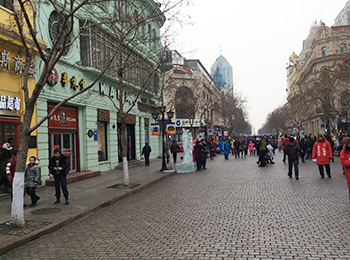When Chinese tour guide Eric Liu found out that Jews were fleeing Paris and other European cities to escape their worsening anti-Semitic environment, he asked if they might want to “return” to his city of Harbin, once among the most vibrant and important Jewish centres in the Far East.
“We welcome them. They are smart, educated and hard-working, and will be a very positive influence for the city,” he said as he recounted the role of Jewish businessmen, musicians, writers, bankers and engineers in making this northeastern Chinese city one of the country’s most prosperous early last century.
The Jewish story is particularly fascinating and tragic as they were the only foreigners to share the same fate as Harbin’s Chinese residents in being racially targeted and robbed by Russian and Japanese occupying forces that were competing with other European countries to colonize China in the first half of the 20th century.
At its peak in the 1920s, the prosperous Jewish community in Harbin numbered 25,000, according to Dan Ben-Canaan, an Israeli academic married to a Chinese woman who has been living and teaching in the city since 2002. Most of the Harbin Jews had fled from Russia, and made their fortune from developing the city into a major centre trading and supplying coal, timber, soybeans, grains and foodstuff from China to Europe.
The first wave of Jews arrived shortly after 1898 when Russia had constructed a railway to connect this resource-rich corner of the country with Russia.
In China’s frontier environment with no history of anti-Semitism, the Jewish community thrived through hard work and their knowledge of international commerce. They were also free to practise their way of life and religion as the Chinese viewed them no differently from other foreigners. In 1903, the community grew sufficiently to establish the Harbin Jewish Association and the city’s first synagogue. At one point, nine of the 17 city’s council members were Jewish and had a role in building Harbin’s main commercial street, hospitals, schools, cinemas, concert halls, a soup kitchen and even its main brewery. Many of these buildings remain intact, with the still-vibrant 1.4 kilometre-long commercial street linking the railway station to the riverbank, a legacy of Harbin’s rise.
But Europe’s problems eventually befell China as more Russians and remnants of the defeated czarist army fled to Harbin following the 1917 Russian Revolution. Hungry, poor and armed, the new arrivals began targeting Harbin’s citizens especially its well-off Jewish community. Many young Jews who had grown up in the city’s relatively sheltered environment encountered acute anti-Semitism for the first time in their lives.
The power struggles that followed took its toll on both the Chinese and Jews. Some of Harbin’s Jews began selling off their assets to mark the first major wave of emigration.
In 1931, the Japanese became the dominant power. Though they generally treated the Jews well, the strain of collaborating with the Japanese Imperial Army which was allied to Nazi Germany and was conducting biochemical experiments on the Chinese population, became too much of a moral burden. Many Jewish businessmen packed up and left China for good.
The Jewish population went into terminal decline after Mao Zedong conquered China in 1949 and appropriated all private property.
In 1963, the last Jewish family left, ending the community’s six-decade involvement in Harbin’s colourful, turbulent and brutal history. The community’s last resident, Hannah Agran, died in 1985, leaving behind a treasure trove of documents, photographs and memorabilia in her apartment that she had collected from other Harbin Jews. While her relatives and friends left, she insisted that she would die in the city that she was born in.
“Her belongings were removed and locked away by the central government. Together with the local government and various groups, we’ve been lobbying Beijing to open up the archives, but to no avail,” Ben-Canaan said in an interview.
China has been quietly growing trade and investment with Israel and Jewish businesses. From about $2.6 billion (US) in 2005, Israel’s bilateral trade with China had grown to $15.59 billion in 2013, just slightly below the $16.3 billion worth of business conducted with the United States.
Given recent growth rates, China could soon overtake the United States as Israel’s largest trading partner, said Ophir Gore, the head of trade mission at the Israeli embassy in Beijing. With China hungry for Israeli water expertise, information technology and farming know-how, the government of Israel has set a target to double its exports to the Asian nation over the next five years.
As if catching up with its own past, Harbin is eager to attract a new wave of Jewish businesses and settlers to replicate the success that the earlier legendary generation had brought. Mayor Song Xibin is leading a delegation to Israel this month to invite Israeli investors to his hometown.
Against the bright lights and connectivity of Beijing, Shanghai and Hong Kong, Harbin stands little chance of pulling in the heavyweight investors. But just like a century ago, events in Europe might once again shine favourably on this almost forgotten corner of China.
Ng Weng Hoong is a Vancouver journalist.
